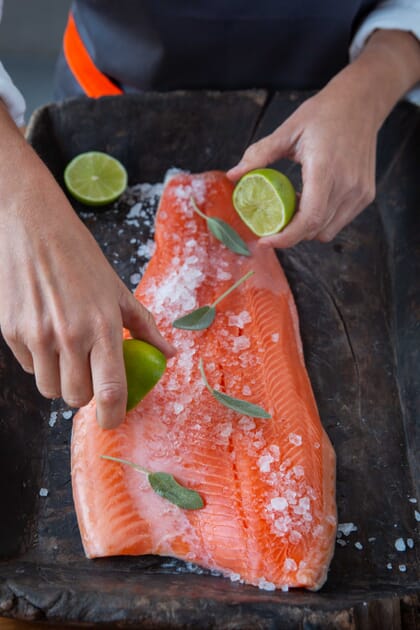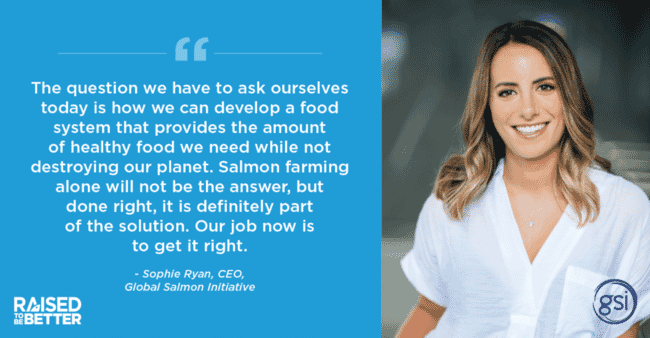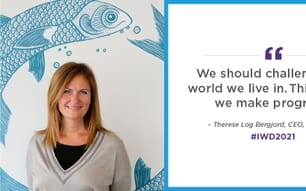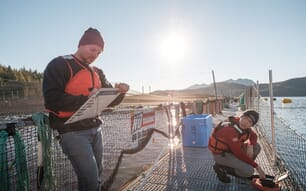
© GSI
Global Salmon Initiative (GSI) published our annual Sustainability Report today. It features the eighth year of independently audited data for each of our salmon farming member companies, which span 40 percent of the salmon farming industry across seven operating regions. The report has become a foundational element of demonstrating both good corporate governance and a commitment to progress against transparent sustainability goals.
However, I believe this year’s report goes even further. It is also an opportunity for us – GSI members and the wider blue foods sector – to highlight the role responsible aquaculture can play in contributing to healthy and sustainable food systems. And right now, we need to be championing this message.
Let me explain why.
As part of the Decade of Action on Nutrition to deliver on the UN's sustainable development goals (SDGs), the secretary-general of the United Nations will convene the first-ever Food Systems Summit (FSS) in September 2021, to help establish the future direction for food systems. The summit aims to unleash bold new actions and innovative solutions to deliver progress on all 17 SDGs, each of which relies to some degree on healthier, more sustainable and equitable food systems.
As a sector we are all very aware of the vital role aquatic foods play within food systems. Approximately three billion people rely on seafood as a primary source of protein. It contributes essential nutrients, often with a comparatively small environmental footprint than other proteins. Yet, blue foods are often missing from conversations on food system evolution and diets. This has to change.
The Ocean Panel reports that the ocean can sustainably provide six times more seafood by 2050, as long as better management and technical innovations are adopted. Oceans have the potential to be pillars of food systems if they are transformed to be more sustainable, nature-positive and accessible. But for this to be possible, we must engage wider society and decision-makers to not only include blue foods in the discussions, but also make them aware of the trajectory many parts of the industry are already on and address head on any of the concerns they may have.
Which is why I would argue there are two key things we need to be doing as an industry.
- Speaking up – sharing and highlighting the many opportunities blue foods can support as part of healthy, sustainable and resilient food systems.
- Transparently documenting both our potential and our challenges. We are not perfect, but by being transparent in our operations – where we’ve made gains and where we need more progress – we can engage in practical and solution-focused dialogue and bring people on our journey to ensure responsible production.
For many of you these are not new ideas. Yet, in my new role as a member of the FSS Champions Network, I have been engaging in conversations across the summit process and have to acknowledge the lack of representation from across our industry. Despite blue foods touching upon every of the FSS action tracks, reference and acknowledgment of the aquaculture industry’s role is hard to come across.
There are ongoing efforts to try and change this – led largely by the Blue Foods Assessment and WorldFish – but more engagement and collective action is needed. This is therefore a call to action to get engaged – whether providing comment on the action track recommendations, joining virtual dialogues (eg this one on May 20 hosted by WorldFish), engaging in the online community forum or on social media. There is no shortage of opportunities to share your experience and the vital contributions blue foods make to sustainable food systems and diets; now is the time to speak up.

GSI's 2021 sustainability report was published today © Image credit
Speaking up itself is not enough, however. We also need to acknowledge where we need to improve, demonstrate a commitment to doing so, and deliver on those commitments. Which is why I believe the GSI Sustainability Report is a solid example of how this is possible. It offers a framework easily replicable in other parts of the industry. The findings allow us to not only report industry wide sustainability data in an open platform for our stakeholders, but it also allows us to track industry-wide progress on key metrics. Perhaps most importantly, it functions as a learning tool to help our members identify where we need to focus improvement efforts. The more we operate in this “all cards on the table approach,” the more we will be able to have effective dialogues on how to ensure the global food system is able to provide enough food in a sustainable manner – and this is not only for blue foods but for all foods.
One of the biggest take-aways from the Independent Food Systems Summit Dialogue GSI recently held with World Wildlife Fund was that no one should operate in a silo. The food system is deeply interconnected, as are supply chains, and as are the efforts of both the public and private sectors. Collective action is going to be critical to the success of this FSS and for the future outlook of the food system.
We cannot allow others to frame our future, we have to take action now, and the Food Systems Summit is the prime opportunity to do so.





